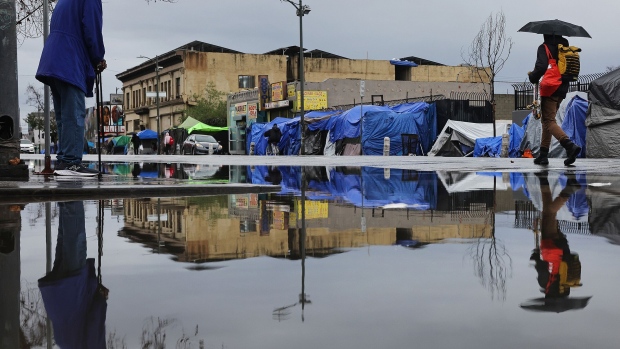Mar 5, 2024
California’s $6.4 Billion Measure on Homelessness Goes to Voters
, Bloomberg News

(Bloomberg) -- Night after night, California’s streets become a refuge for tens of thousands of people. They sleep in cars, tents, and RVs, many wrestling with mental illness, substance abuse, or both, and often with little access to care.
The grim scene underscores a deepening homelessness crisis that persists despite record spending. Five years into his time as governor, Gavin Newsom has directed more than $20 billion of state investment to combat the problem but the spending has coincided with a 20% surge in the homeless population, which now tops 180,000 people.
As the urgency intensifies, Newsom is turning to voters with Proposition 1, a ballot measure that proposes a $6.4 billion bond sale to fund new housing and expand treatment programs for mental illness and addiction. Polling suggests that the measure is likely to pass in voting on Tuesday.
“The governor’s number one priority is tackling the homelessness crisis, he has a lot invested in Prop 1 and he made it very clear that that was all we were going to have on the primary ballot” for Tuesday’s vote, said Democratic Assemblymember Alex Lee.
Ron Galperin, a former Los Angeles city controller, has been vocal in his criticism of the state’s handling of the crisis. His audits exposed significant delays and cost overruns in the city’s housing and homelessness programs. Galperin describes the situation in California as a “homeless industrial complex,” characterized by a multitude of stakeholders with varying motivations — all of which has been hindering effective action.
“With so many players, funding sources, nonprofits and developers, there are a lot of mixed incentives,” Galperin said in an interview. “I think that it’s become very clear that the promulgation of the tents has not just become a symptom of the problem, but a huge problem unto itself.”
Read More: LA Paying $600,000 Apiece for Units to House Homeless People (1)
Despite his criticism, Galperin says he supports Prop 1, citing its focus on the neediest and most visible individuals. Galperin’s nuanced stance reflects the complexities of channeling additional funds to an issue that has already seen vast resources poured into it with mixed results.
Prop 1’s detractors argue that it could create funding conflicts among mental health, housing, and substance use programs. Carmen-Nicole Cox, director of government affairs at ACLU California Action, expressed concerns that the measure emphasizes forced treatment over community support.
In addressing some of the biggest struggles associated with life on the street, Newsom initiated a revamp of the state’s mental health system, signing a law last year that makes it easier to force people with behavioral health issues into treatment. The move has been met with resistance by organizations such as Disability Rights California, which views it as an infringement on rights.
“More Californians with disabilities will be locked in costly institutions instead of being offered treatment in their communities in a manner that respects personal autonomy, supports holistic recovery, and encourages people to seek help,” the nonprofit said in a statement.
Read More: Rich California City’s Housing Fix Is $150,000 Cargo Containers
The proposed $6.4 billion bond aims to address California’s housing shortage, which is estimated at more than 3 million units. The sale is projected to finance the construction of facilities capable of accommodating 6,800 individuals for mental health and substance abuse treatment, along with adding more outpatient treatment slots. It also aims to create up to 4,350 housing units, with 2,350 set aside for veterans, which will include new construction and conversions of hotels and motels into homes.
In addition to the bond, Prop 1 would also restrict how the state and counties spend money raised by a 1% tax on the incomes of millionaires. This levy has generated more than $20 billion in revenue since voters approved it in 2004 as part of the the Mental Health Services Act.
Karen Krop, a senior director of US public finance at Fitch Ratings, said that even with new bond sales approved by voters, California’s long-term debt compared to personal income and government revenue won’t significantly shift and remains manageable.
“We don’t expect California’s long-term liability burden to dramatically change if voters approve the new bond sales,” Krop said.
The debate over Prop 1 has brought into sharper focus that California has become the face of homelessness in the US, with data showing the state accounts for half of the unsheltered people nationwide. The Democratic governor has both acknowledged the severity of the challenge and been a lightning rod for criticism about the state’s approach to tackling the issue.
“No amount of progress can camouflage the most pernicious crisis in our midst, the ultimate manifestation of poverty: homelessness,” Newsom said in his State of the State address in 2020, dedicating his speech to the issue.
During a prime-time debate in November on Fox News, Republican Florida Governor Ron DeSantis derided Newsom’s handling of the homelessness crisis with a map of all the places in San Francisco where human feces had been spotted.
“It’s long overdue,” said Galperin when asked about Prop 1. “It’s never going to be enough but we have an obligation as a society to say, ‘we are not going to just let you decide to die on the street.’”
©2024 Bloomberg L.P.






